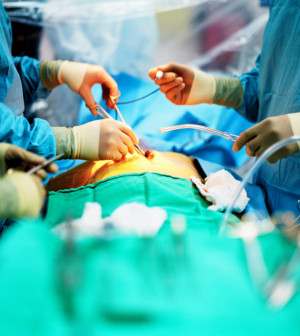- 7 Best Breads for Maintaining Stable Blood Sugar
- Gelatin vs. Collagen: Which is Best for Skin, Nails, and Joints?
- The Long-Term Effects of Daily Turmeric Supplements on Liver Health
- Could Your Grocery Store Meat Be Causing Recurring UTIs?
- Are You Making This Expensive Thermostat Error This Winter?
- Recognizing the Signs of Hypothyroidism
- 10 Strategies to Overcome Insomnia
- Could Artificial Sweeteners Be Aging the Brain Faster?
- Techniques for Soothing Your Nervous System
- Does the Water in Your House Smell Funny? Here’s Why
Breast-Feeding May Reduce Risk of Aggressive Breast Cancer: Study

A new study finds a link between breast-feeding and a woman’s reduced risk for an aggressive form of breast cancer called hormone-receptor-negative breast cancer.
This type of cancer accounts for about 20 percent of breast cancer cases in the United States and is more common among women younger than 50, black women and those with the BRCA1 gene mutation, the researchers said.
The large international study found that women who breast-fed were up to 20 percent less likely to develop hormone-receptor-negative breast cancer than those who did not breast-feed. Researchers observed an association but they did not prove a cause-and-effect relationship.
The findings were published Oct. 26 in the journal Annals of Oncology.
“Further evidence to support the long-term protection of breast-feeding against the most aggressive subtypes of breast cancer is very encouraging and actionable,” said study co-author Dr. Marisa Weiss in an American Cancer Society news release. Weiss is president and founder of Breastcancer.org and director of breast health outreach at Lankenau Medical Center in Wynnewood, Pa.
“Breast-feeding is a relatively accessible, low-cost, short-term strategy that yields long-lasting natural protection,” she noted.
The findings show the need for more public health programs that directly inform women about the benefits of breast-feeding, and for removal of obstacles to breast-feeding in the home, community and workplace, the researchers said.
Dr. Paolo Boffetta is associate director for population sciences at Tisch Cancer Institute at the Icahn School of Medicine at Mount Sinai in New York City. He said in the news release, “Pregnant women and young mothers are highly receptive and motivated to make healthy choices. We need to encourage women who are able to breast-feed to do so for their breast health, in addition to the health of their children.”
Further research is needed to learn more about how breast-feeding reduces the risk of hormone-receptor-negative breast cancer and its effect on other types of breast cancer, Boffetta added.
More information
The U.S. Office on Women’s Health has more about breast-feeding.
Source: HealthDay
Copyright © 2026 HealthDay. All rights reserved.










